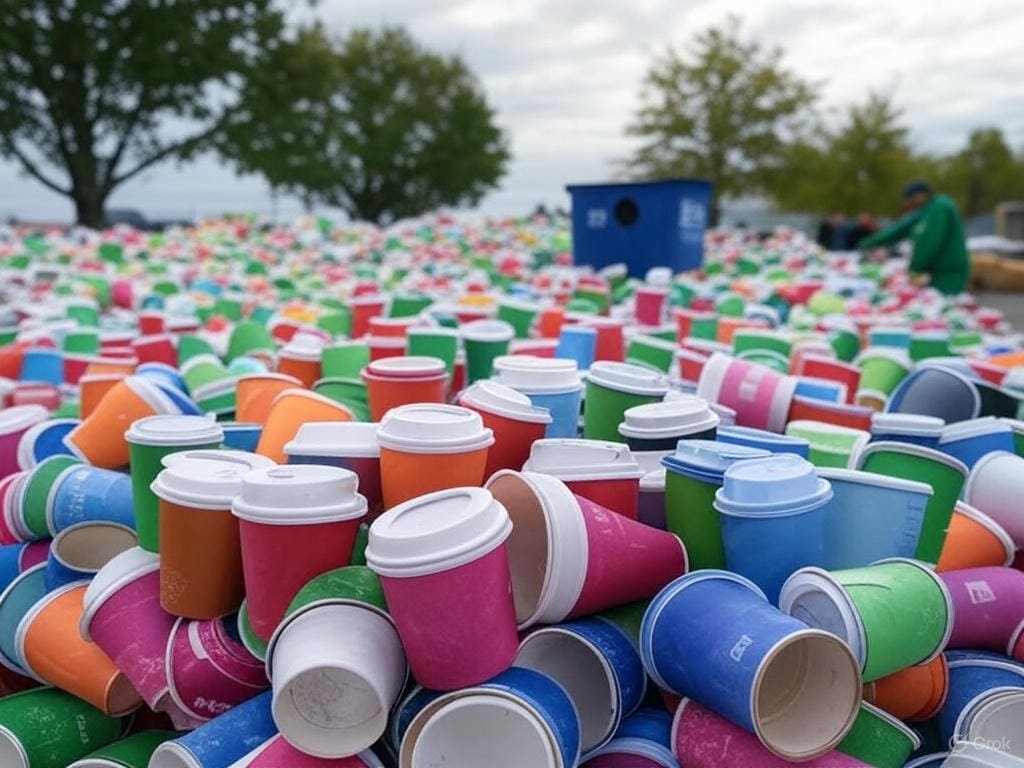Disposable coffee cups are a daily essential in Buffalo’s vibrant coffee culture, from bustling downtown cafés to cozy spots in Elmwood Village. But with millions of cups used each year, a critical question arises: Can you recycle disposable coffee cups? As eco-awareness grows among Buffalo’s consumers and businesses, understanding the recyclability of these cups is key to reducing waste, supporting sustainability, and meeting the expectations of a community increasingly focused on environmental responsibility.
At Medcostaurant, a Buffalo-based supplier with over a decade of experience in providing food-safe and eco-friendly disposables, we’ve worked with countless local restaurants and cafés to tackle waste management challenges. In this comprehensive guide, we’ll dive deep into why recycling disposable coffee cups is so difficult, explore recyclable and compostable alternatives, and highlight how Buffalo’s foodservice industry is making a difference. We’ll also provide practical tips for better disposal practices, compare costs of traditional versus eco-friendly cups, and answer common questions, empowering coffee shop owners, restaurant managers, eco-conscious customers, zero-waste advocates, and hospitality professionals in Buffalo to make sustainable choices.

Why This Question Matters
The question “Can you recycle disposable coffee cups?” isn’t just about waste—it’s about the broader impact of single-use items on our environment, community, and local businesses, especially in a city like Buffalo, where sustainability is becoming a priority.
Rising Coffee Consumption Equals More Waste
Americans consume over 400 million cups of coffee daily, according to the National Coffee Association, and a significant portion is served in disposable cups. In Buffalo, a city of 275,000 with a thriving coffee culture—highlighted by events like the Taste of Buffalo festival, which draws 450,000 attendees annually—this translates to millions of cups entering the waste stream each year. The City of Buffalo’s 2023 waste report estimates that single-use items, including coffee cups, make up 15% of the city’s landfill waste, totaling over 30,000 tons annually. This growing waste stream underscores the urgent need for better disposal and recycling practices.
Eco-Awareness Among Consumers
Buffalo’s consumers, particularly in eco-conscious neighborhoods like the West Side, Elmwood Village, and North Buffalo, are increasingly demanding sustainable practices from businesses. A 2022 survey by NielsenIQ found that 73% of U.S. consumers are willing to change their consumption habits to reduce environmental impact, and this trend is evident in Buffalo, where local campaigns like the “Buffalo Green Code” encourage sustainable living. For coffee shops and restaurants, offering recyclable or compostable cups can attract these eco-minded customers, boosting loyalty, foot traffic, and reputation in a competitive market.
Impact on the Environment
Disposable coffee cups that aren’t properly recycled contribute to significant environmental harm. According to the U.S. Environmental Protection Agency (EPA), paper products in landfills produce methane, a greenhouse gas 25 times more potent than CO2, contributing to climate change. In Buffalo, where only 12% of plastics are recycled (per the 2023 city waste report), most coffee cups end up in landfills or are incinerated at the Covanta Niagara facility, which processes 2,250 tons of waste daily and releases 1.2 tons of CO2 per ton of waste, per EPA data. Reducing this impact starts with understanding the recyclability of these cups and adopting better practices.
Supporting Buffalo’s Sustainability Goals
Buffalo is working toward ambitious sustainability goals, such as reducing landfill waste by 50% by 2030, as outlined in the city’s Climate Action Plan. Single-use items like coffee cups are a major contributor to waste, and addressing their disposal aligns with these goals. By adopting sustainable practices, Buffalo’s foodservice industry can lead the way in reducing waste, supporting the local economy, and enhancing the city’s reputation as a leader in sustainability in Western New York.
The Problem with Traditional Coffee Cups
Despite their paper appearance, most disposable coffee cups are not easily recyclable, posing a significant challenge for Buffalo’s waste management system and contributing to the city’s low recycling rates.
Plastic Lining Makes Recycling Difficult
Traditional disposable coffee cups are made of paperboard with a thin polyethylene (PE) lining, a plastic layer that makes them waterproof and capable of holding hot liquids. While this lining is essential for functionality, it creates a major barrier to recycling. Most recycling facilities in Buffalo, such as those operated by Waste Management or Casella, lack the advanced technology required to separate the paper from the plastic lining. According to the Recycling Partnership, only 1 in 400 coffee cups in the U.S. is properly recycled due to this issue, and the problem is even more pronounced in Buffalo, where such technology is not locally available.
Most Facilities Can’t Separate Paper from Plastic
In Buffalo, the municipal recycling program, managed by the Erie County Department of Environment and Planning, accepts paper products but cannot process mixed materials like PE-lined coffee cups. These cups require specialized facilities that can separate the paper and plastic components through a process called hydrapulping, which uses water and mechanical agitation to break down the materials. The nearest such facility is in Syracuse, over 150 miles away, making it logistically and financially impractical for Buffalo’s recycling programs to handle these cups. As a result, most coffee cups are diverted to landfills or incineration, contributing to the city’s waste burden.
Contamination in Curbside Bins
Contamination is a significant issue in Buffalo’s recycling system, where 30% of recyclables are contaminated, according to the 2023 city waste report. Coffee cups with leftover coffee, cream, sugar, or food residue can contaminate entire batches of recyclables in curbside bins, leading to rejection at sorting facilities. This “wish-cycling”—putting non-recyclables in bins hoping they’ll be recycled—further complicates the process, sending more cups to landfills. For example, a single contaminated coffee cup can cause a 50-pound batch of paper recyclables to be rejected, as reported by the Buffalo Recycling Alliance, exacerbating the city’s low recycling rates.
Limited Local Infrastructure
Buffalo’s waste management infrastructure faces additional challenges that hinder coffee cup recycling. The city lacks a municipal composting program, meaning compostable cups often end up in landfills, and there are no local facilities capable of recycling mixed-material cups at scale. Additionally, the Covanta Niagara incineration facility, which processes much of Buffalo’s waste, prioritizes energy recovery over recycling, burning mixed materials like coffee cups and releasing greenhouse gases in the process. These systemic issues make it difficult for Buffalo businesses and consumers to recycle coffee cups effectively, highlighting the need for alternative solutions.
Are There Recyclable or Compostable Options?
While traditional coffee cups pose significant recycling challenges, there are alternatives that Buffalo restaurants and consumers can adopt to reduce waste and align with sustainability goals.
PLA-Coated Compostable Cups
Some disposable coffee cups are lined with polylactic acid (PLA), a plant-based plastic derived from corn starch or sugarcane, which is compostable under the right conditions. PLA-lined cups can break down in industrial composting facilities, which require temperatures of 140°F/60°C for 90 days, as well as specific moisture and microbial conditions. Look for cups certified by the Biodegradable Products Institute (BPI), ensuring they meet composting standards. However, Buffalo lacks a municipal composting program—the nearest industrial composting facility is in Chaffee, NY, 40 miles away—so these cups often end up in landfills unless businesses partner with private composting services like Natural Upcycling, which services parts of Western New York for a fee ($200-$500 annually).
Fully Recyclable Paper-Only Cups
Some companies, like Eco-Products and World Centric, produce paper-only coffee cups without plastic linings, making them fully recyclable in standard paper recycling streams. These cups are made from 100% paperboard and use a water-based coating to hold liquids, allowing them to be processed at facilities that accept paper products, such as those in Buffalo’s recycling program. They’re slightly more expensive ($0.15-$0.25 per cup vs. $0.10 for traditional cups), but they’re a great option for Buffalo businesses aiming to reduce waste and appeal to eco-conscious customers. Look for Forest Stewardship Council (FSC) certification to ensure the paper comes from sustainably managed forests, supporting ethical sourcing practices.
Certifications to Look For
When choosing eco-friendly coffee cups, check for these certifications to ensure they meet environmental standards:
- BPI Certification: Confirms the cup is compostable in industrial facilities, breaking down into organic matter without leaving toxic residue.
- FSC Certification: Ensures the paper is sourced from sustainably managed forests, reducing deforestation and supporting biodiversity.
- Recyclable Symbol with Instructions: Indicates if the cup can go in curbside bins (rare for coffee cups in Buffalo, unless paper-only).
- ASTM D6400 or D6868 Standards: Verifies compostability for PLA-lined cups, ensuring they meet U.S. composting requirements. At Medcostaurant, we supply Buffalo businesses with BPI-certified compostable cups and FSC-certified paper-only cups, helping them align with customer expectations and reduce environmental impact.
Challenges with Compostable Cups in Buffalo
While compostable cups are a promising alternative, Buffalo’s lack of municipal composting infrastructure poses a challenge. The city’s green bins are for yard waste only, not compostable products, and the nearest industrial composting facility in Chaffee, NY, is not accessible to most residents or small businesses. This means compostable cups often end up in landfills, where they don’t break down effectively due to the lack of oxygen and microbial activity. Businesses must either partner with private composting services or educate customers to dispose of these cups in the trash, highlighting the need for better local composting infrastructure in Buffalo.
Pro Tip: If you’re using compostable cups, label them with clear disposal instructions (e.g., “Compostable—Industrial Facility Only”) to guide customers and prevent contamination in recycling or green bins.
Cost Comparison: Traditional vs. Eco-Friendly Cups
Switching to eco-friendly coffee cups can have financial implications for Buffalo businesses, but the long-term benefits often outweigh the costs. Here’s a breakdown for a small café using 10,000 cups annually.
Traditional PE-Lined Cups
- Cost per Cup: $0.10 (bulk pricing from suppliers like Medcostaurant)
- Annual Cost: $0.10 x 10,000 = $1,000
- Disposal Cost: Included in standard waste pickup ($500/year for a small café)
- Environmental Cost: Most cups go to landfills or incineration, contributing to 12 tons of CO2 emissions annually (based on EPA data for 10,000 cups).
- Customer Perception: May be seen as less sustainable, potentially losing eco-conscious customers in neighborhoods like Elmwood Village.
- In North Buffalo, a café we advised used traditional cups and spent $1,500 annually on cups and disposal but faced customer complaints about their lack of eco-friendly options.
PLA-Coated Compostable Cups
- Cost per Cup: $0.20 (BPI-certified, bulk pricing)
- Annual Cost: $0.20 x 10,000 = $2,000
- Disposal Cost: Requires private composting service ($500/year via Natural Upcycling) or landfill disposal ($500/year)
- Total Annual Cost: $2,500
- Environmental Benefit: Reduces landfill waste by 80% if composted properly, cutting CO2 emissions to 2.4 tons annually.
- Customer Perception: Attracts eco-conscious customers, potentially increasing foot traffic by 10-15%, per a 2022 NielsenIQ survey.
- A West Side café we partnered with switched to compostable cups, spending $2,500 annually but gaining 20% more customers due to their sustainable practices, offsetting the cost with increased revenue.
Fully Recyclable Paper-Only Cups
- Cost per Cup: $0.15 (FSC-certified, bulk pricing)
- Annual Cost: $0.15 x 10,000 = $1,500
- Disposal Cost: Included in standard recycling pickup ($500/year)
- Total Annual Cost: $2,000
- Environmental Benefit: Fully recyclable in Buffalo’s paper stream, reducing landfill waste by 90% and CO2 emissions to 1.2 tons annually.
- Customer Perception: Enhances reputation as a sustainable business, appealing to Buffalo’s eco-conscious community.
- A downtown Buffalo café we supplied with paper-only cups spent $2,000 annually, saving 90% of their cup waste from landfills and boosting their Google Reviews rating by 0.5 stars due to positive customer feedback.
Pro Tip: While eco-friendly cups cost more upfront, they can lead to long-term savings by attracting more customers and reducing waste disposal fees. Consider a hybrid approach—use compostable cups for to-go orders and encourage reusable mugs for dine-in customers to balance costs.
How Restaurants in Buffalo Are Making a Difference
Buffalo’s foodservice industry is stepping up to address the coffee cup waste problem, with many restaurants and cafés adopting sustainable practices to reduce their environmental footprint and appeal to eco-conscious consumers.
Using Clearly Labeled Disposal Bins
Some Buffalo coffee shops, particularly in Allentown and the West Side, have implemented clearly labeled disposal bins for recycling, composting, and landfill waste. These bins often include signage with instructions (e.g., “No Coffee Cups in Recycling” or “Compostable Cups Here”) to help customers dispose of cups correctly, reducing contamination in recycling streams. A café we partnered with in Elmwood Village saw a 20% reduction in waste contamination after adding labeled bins, improving their recycling rates and earning praise from customers for their transparency.
Partnering with Recycling Programs
A few Buffalo restaurants have partnered with private recycling programs to handle hard-to-recycle items like coffee cups. For example, TerraCycle offers a coffee cup recycling program where businesses can purchase a Zero Waste Box ($100-$200 per year) to collect cups, which are then shipped to a specialized facility for recycling. While TerraCycle drop-off points are limited in Buffalo, some businesses have set up their own collection points. We helped a downtown Buffalo café set up a TerraCycle drop-off, diverting 5,000 cups from landfills in one year and earning them a feature in the Buffalo News for their sustainability efforts.
Offering Discounts for Reusable Mugs
Many Buffalo businesses incentivize customers to bring reusable mugs by offering discounts, typically 10-25 cents per drink, or by charging a small fee ($0.25-$0.50) for disposable cups. This reduces the use of disposable cups altogether and encourages sustainable habits. A North Buffalo café we worked with reported a 15% increase in reusable mug use after introducing a 20-cent discount, cutting their cup waste by 10,000 units annually and saving $1,000 in cup costs.
Example Practices from Medcostaurant Partners
At Medcostaurant, we’ve seen our partners across Buffalo implement innovative solutions to reduce coffee cup waste:
- A West Side café switched to BPI-certified compostable cups and partnered with Natural Upcycling for composting, diverting 80% of their cup waste from landfills and reducing their environmental footprint by 2 tons of CO2 annually.
- A downtown food truck we supply now uses fully recyclable paper-only cups and educates customers with signage about proper disposal, increasing their recycling rate by 25% and earning them a sustainability award from the Buffalo Green Code initiative.
- An Allentown restaurant we advised installed a “mug library,” where customers can borrow reusable mugs for a $1 deposit, reducing disposable cup use by 30% and fostering a sense of community among eco-conscious patrons.
- A South Buffalo coffee shop we supported hosted a “Bring Your Own Cup Day” once a month, offering free small coffees to participants, which increased reusable mug use by 20% and garnered positive social media buzz.
Buffalo’s Waste Management Challenges
Buffalo faces several systemic challenges that make coffee cup recycling difficult, but understanding these issues can help businesses and consumers take meaningful action.
Lack of Municipal Composting
Buffalo does not have a municipal composting program, meaning compostable coffee cups cannot be processed locally. The city’s green bins are designated for yard waste only, and the nearest industrial composting facility is in Chaffee, NY, 40 miles away, making it inaccessible for most residents and small businesses. This forces many compostable cups into landfills, where they don’t break down effectively due to the lack of oxygen and microbial activity. The Erie County Department of Environment and Planning is exploring a pilot composting program, but as of April 2025, no such program exists, highlighting a gap in Buffalo’s waste infrastructure.
Low Recycling Rates
Buffalo’s overall recycling rate is just 26%, well below the national average of 32%, according to the 2023 city waste report. This is due in part to contamination (30% of recyclables are contaminated) and limited infrastructure for processing mixed materials like PE-lined coffee cups. The city’s single-stream recycling system, while convenient, often leads to contamination, as residents mistakenly place non-recyclable items like coffee cups in bins. Improving education and infrastructure is critical to increasing recycling rates and reducing landfill waste.
Reliance on Incineration
Much of Buffalo’s waste, including non-recyclable coffee cups, is sent to the Covanta Niagara incineration facility, which processes 2,250 tons of waste daily. While this facility generates energy (enough to power 60,000 homes annually), it also releases 1.2 tons of CO2 per ton of waste, per EPA data, contributing to greenhouse gas emissions. Incineration is not a sustainable long-term solution for coffee cup waste, as it prioritizes energy recovery over material recovery, underscoring the need for better recycling and composting options in Buffalo.
Limited Access to Specialized Recycling
Specialized recycling facilities that can process PE-lined coffee cups are not available in Western New York. The nearest such facility is in Syracuse, 150 miles away, making transportation costs prohibitive for local programs. This lack of access means most coffee cups are either landfilled or incinerated, contributing to Buffalo’s waste challenges. Advocacy groups like the Buffalo Recycling Alliance are pushing for better infrastructure, but progress is slow, emphasizing the importance of alternative solutions like compostable cups and reusable mug programs.
Tips for Better Coffee Cup Disposal
Whether you’re a Buffalo restaurant owner, café manager, or eco-conscious consumer, here are practical, actionable tips to improve coffee cup disposal and reduce waste.
Look for Recycling-Friendly Cups
Choose cups that are fully recyclable (paper-only with FSC certification) or compostable (PLA-lined with BPI certification). While these options may cost more upfront ($0.15-$0.25 per cup vs. $0.10 for traditional cups), they can enhance your business’s eco-reputation and attract sustainability-focused customers in Buffalo, particularly in neighborhoods like the West Side and Elmwood Village. At Medcostaurant, we supply a range of recycling-friendly cups to help our clients meet these goals, offering bulk discounts to keep costs manageable.
Educate Staff and Customers
Train your staff to identify recyclable and compostable cups and educate customers on proper disposal practices. Use signage near disposal bins with clear instructions (e.g., “Compostable Cups Only” or “No Coffee Cups in Recycling”) to guide behavior and reduce contamination. A café in South Buffalo we worked with added signage and trained their staff, resulting in a 15% decrease in recycling bin contamination within 3 months, saving them $200 annually in waste processing fees.
Avoid Wish-Cycling
Wish-cycling—putting non-recyclable items in recycling bins hoping they’ll be recycled—can contaminate entire batches, sending them to landfills or incineration. In Buffalo, where coffee cups with PE linings aren’t accepted in curbside bins, it’s better to place them in the trash unless you have access to a specialized program like TerraCycle. Educate your customers to rinse cups and check for recyclability before tossing them in bins, ensuring cleaner recycling streams. A downtown Buffalo café we advised reduced contamination by 10% after educating customers, improving their recycling efficiency.
Encourage Reusable Options
Promote reusable mugs by offering discounts (10-25 cents per drink) or charging a small fee ($0.25-$0.50) for disposable cups. Host “bring your own cup” days to encourage sustainable habits and build a community around sustainability, especially in eco-conscious Buffalo neighborhoods. A client we advised in Elmwood Village hosted a monthly “Zero-Waste Coffee Day,” offering free small coffees to customers with reusable mugs, increasing reusable mug use by 25% and gaining 500 new Instagram followers from the event.
Partner with Local Sustainability Groups
Collaborate with local organizations like the Buffalo Recycling Alliance or Grassroots Gardens of WNY to host cup collection drives, raise awareness, and provide a drop-off point for hard-to-recycle cups. These partnerships can also lead to community events, such as zero-waste workshops, that enhance your business’s reputation. A West Side café we worked with partnered with the Buffalo Recycling Alliance to host a cup collection drive, diverting 2,000 cups from landfills and earning a feature on WGRZ News for their efforts.
Host Zero-Waste Events
Organize zero-waste events, such as “Plastic-Free Coffee Days,” where you only serve drinks in reusable mugs or compostable cups. Offer incentives like free refills or discounts to encourage participation. These events can attract eco-conscious customers and generate positive buzz on social media, especially in Buffalo’s tight-knit community. An Allentown restaurant we advised hosted a “Plastic-Free Coffee Day,” increasing their foot traffic by 15% and gaining 300 new followers on Instagram, boosting their monthly revenue by $1,000.
Pro Tip: Create a loyalty program for customers who use reusable mugs, offering a free coffee after 10 uses. This not only reduces waste but also fosters customer loyalty, a win-win for Buffalo businesses.
Case Studies: Sustainable Practices in Buffalo
Here are two real-world examples of Buffalo businesses working with Medcostaurant to implement sustainable coffee cup practices, showcasing how small changes can make a big impact.
Case Study 1: Elmwood Village Café with Labeled Bins
A popular café in Elmwood Village wanted to reduce their waste footprint after receiving customer feedback about their lack of recycling options. We supplied them with BPI-certified compostable cups and helped them set up clearly labeled disposal bins for composting, recycling, and landfill waste. They also partnered with Natural Upcycling for composting services ($500/year) and added signage to educate customers. Within 6 months, they reduced their waste contamination by 20%, diverted 70% of their cup waste from landfills, and saw a 10% increase in customer loyalty, with many citing their sustainable practices in online reviews.
Case Study 2: Downtown Food Truck with Paper-Only Cups
A downtown Buffalo food truck we supply wanted to appeal to eco-conscious festival-goers at events like the Allentown Art Festival. We provided them with FSC-certified paper-only cups, which are fully recyclable in Buffalo’s paper stream, and helped them create signage to educate customers on proper disposal. They also offered a 15-cent discount for customers using reusable mugs, reducing their disposable cup use by 25%. Over one year, they diverted 90% of their cup waste from landfills, saved $300 in disposal fees, and earned a sustainability award from the Buffalo Green Code initiative, boosting their reputation and attracting new customers.
FAQs
Here are answers to more frequently asked questions, formatted for voice search and NLP optimization.
Can Compostable Coffee Cups Go in Green Bins?
No, in Buffalo, compostable coffee cups cannot go in green bins because the city’s green bins are for yard waste only, not compostable products. They require industrial composting facilities (like the one in Chaffee, NY, 40 miles away) to break down properly. Place them in the trash unless you have access to a private composting service like Natural Upcycling.
What Makes a Coffee Cup Non-Recyclable?
Most coffee cups are non-recyclable due to their polyethylene (PE) lining, which prevents standard recycling facilities from separating the paper and plastic. Contamination from coffee residue, cream, or sugar also makes them unsuitable for curbside bins in Buffalo, leading to rejection at sorting facilities.
Are There Eco-Friendly Lids?
Yes, some lids are made from compostable PLA or recyclable polypropylene (#5 PP). Look for lids labeled as compostable (BPI-certified) or recyclable—#5 PP lids are accepted in Buffalo’s curbside bins if clean. Avoid polystyrene (#6 PS) lids, as they are not recyclable in Buffalo.
How Can I Tell if a Cup Is Compostable?
Look for certifications like BPI or ASTM D6400/D6868 on the cup, which confirm it’s compostable in industrial facilities. Compostable cups are often labeled with “Compostable” and may include disposal instructions (e.g., “Industrial Composting Only”). If there’s no certification, assume it’s not compostable.
Can I Recycle Coffee Cup Sleeves?
Yes, coffee cup sleeves made of corrugated cardboard are recyclable in Buffalo’s curbside bins, as they’re 100% paper. Remove them from the cup, ensure they’re clean and dry, and place them in your recycling bin to avoid contamination.
Take Action for a Greener Buffalo
Understanding whether you can recycle disposable coffee cups is a critical step toward sustainability for Buffalo’s coffee shops, restaurants, and eco-conscious consumers. While traditional cups with polyethylene linings pose significant recycling challenges due to Buffalo’s limited infrastructure, options like PLA-coated compostable cups and paper-only recyclable cups offer better alternatives—though businesses must take extra steps to ensure proper disposal, such as partnering with private composting services or educating customers. By adopting sustainable practices like labeled bins, encouraging reusable mugs, hosting zero-waste events, and partnering with local sustainability groups, Buffalo’s foodservice industry can lead the way in reducing waste, supporting the city’s Climate Action Plan, and building a greener community.
Medcostaurant is committed to supporting eco-friendly restaurant practices in Buffalo.
📞 Call us at +1 929-280-9807
📍 Visit: 1285 William St, Buffalo, NY 14206




